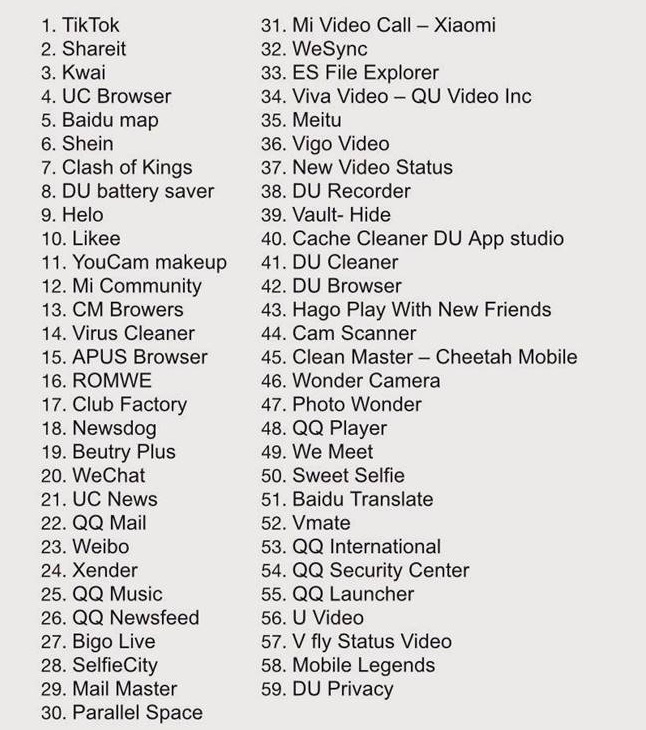Why in news?
India has banned 59 apps originating from China, including very popular ones like the TikTok, UC Browser, ShareIt, and CamScanner.
What is the legal basis for India’s action?
- The ban has been enforced under Section 69A of the Information Technology Act, 2000.
- It offers the power to issue directions for blocking for public access of any information through any computer resource.
- This is done in the interest of -
- sovereignty and integrity of India
- defence of India, security of the State
- friendly relations with foreign States
- public order (or)
- for preventing incitement to the commission of any cognizable offence relating to above
- The Ministry of Information and Technology said that it has received many complaints in this regard.
- There were reports on misuse of some mobile apps.
- There was stealing and secretly transmitting users’ data in an unauthorised manner to servers that have locations outside India.
- The notification is expected to be followed by instructions to Internet service providers to block these apps.
- Users will soon see a message saying access to the apps has been restricted on the request of the government.
- [The list of the banned apps is provided below]

- Some apps on the banned list are very popular in India.
- The TikTok app, especially, has over 100 million active users in the country.
- About 30% of TikTok’s downloads is said to be coming from India.
- Google-owned YouTube has more users in India than TikTok.
- But TikTok was seen as having more potential in terms of personalisation of content and overall influence.
- TikTok made relentless push into India’s hinterland. Evidently, the app supports over 15 Indian languages.
- This enabled the app to work on regional talent in a very personalised manner.
- New social media platforms like Helo and Likee, as well as video chat app Bigo Live, are immensely popular among Indians who are not comfortable in English.
- These users will have to look for substitutes.
- Also, most of these platforms have Indian creators, for many of whom this is the only source of income.
- Many of these apps have offices and employees in India, and a few thousand jobs could be at stake now.
Has TikTok been banned earlier?
- TikTok has been blocked in India once earlier.
- In, May 2019, in the run up to the general elections, the government banned the app’s downloads for 2 weeks following a Madras High Court ruling.
- The Court observed that it could expose children on the app to graphic content or predators.
- TikTok had appealed and the court subsequently reversed its ruling.
- But this time, though, the ban could be there to stay.
How strategic is the move and how does it impact China?
- The move comes as an exercise of coercive diplomacy with China amid the tense standoff in Ladakh.
- The decision has been taken in a specific strategic and national security context.
- So, it could be a warning to bigger Chinese businesses in India, and to China itself.
- However, the government has, for now, picked up a low-denomination item - mobile apps.
- This has only a limited impact on Indian businesses.
- But it has a disproportionately large presence in the mass consumer segment.
- This may not hurt India given the alternatives in the app space.
- But for China, the Indian app market is growing and valuable.
- More so because internet costs here are one of the lowest in the world, and consumers number over 800 million.
- Nearly half of these smartphone users are below 25 and hungry for content on their devices.
- A decision at stopping physical goods could have been challenged by China at the WTO.
- Instead, this move focuses on the technology sector.
- A ban on physical goods would have also adversely affected India’s business and economy while hardly making a dent on China’s.
- The move is thus being seen as one that could be more effective from New Delhi’s perspective.
Source: Indian Express
